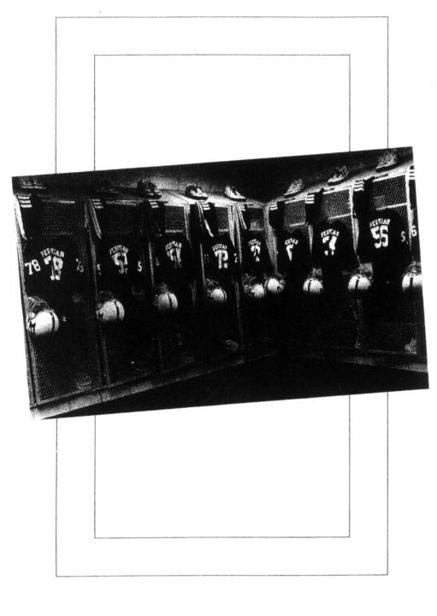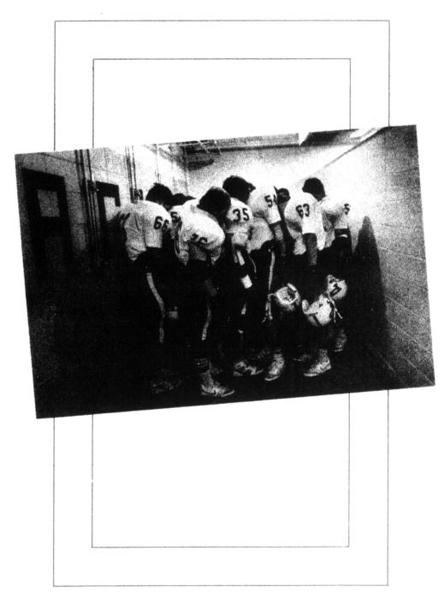Friday Night Lights: A Town, a Team, and a Dream (56 page)
Read Friday Night Lights: A Town, a Team, and a Dream Online
Authors: H. G. Bissinger
Tags: #State & Local, #Physical Education, #Permian High School (Odessa; Tex.) - Football, #Odessa, #Social Science, #Football - Social Aspects - Texas - Odessa, #Customs & Traditions, #Social Aspects, #Football, #Sports & Recreation, #General, #United States, #Sociology of Sports, #Sports Stories, #Southwest (AZ; NM; OK; TX), #Education, #Football Stories, #Texas, #History

She looked at the clock and watched the seconds disappear. She watched Hill move downfield and her heart leapt, so close
were they, just ten yards away!
And then the Permian crowd turned sour and she knew
something horrible had happened.
Center Clint Duncan was called for holding. Jessie Armstead
had been flying by him on the play, and desperate to do something to stop him, Duncan had tackled him. Permian had a
third and seventeen at the Carter 35. They ran another trick
play with Hill throwing to Winchell for an eleven-yard gain. It
gave Permian a fourth and six at the Carter 24 with ten seconds
left. Carter called time-out.
Ronnie Bevers knelt to the ground to pray. Winchell was still
afraid to look at the clock. Duncan, dwelling on the holding
penalty despite efforts to block it out of his mind, said nothing.
Winchell called the play that had been sent in from the sidelines, sixty-one pass. During their six-year careers they had
practiced and run it a thousand times. The players were aware
of nothing, the frantic yells of the crowd, the clock, the dwindling light, the gray sadness of it all. They were only aware that
this was where they either went to State, or turned into has-
beens as quickly as the golden coach turned into a pumpkin.
Right before coming to the line of scrimmage, McDougal
turned to Bevers and said simply, "This is it."
Winchell, lining up over the center, saw Hill double-covered
and knew he would not be able to get the ball to him. He would
have to look instead for flanker Robert Brown over the middle.
Duncan hiked the ball and went into his pass block stance. He
didn't look up, because the sound of the crowd would tell him
whether the pass was complete or not. Brown turned toward
Winchell, a signal that he was open.
Winchell threw the ball.
Duncan waited and listened.
And he was exactly right, the sound of the crowd did tell him
who had won and who had lost, a sudden, joyful eruption that
came from one of the sides like a blast of bullets to hail a surrender. As Clint Duncan later related it, he could also tell from
something else.
"I saw a bunch of cocky niggers jumping up and down."
Dale McDougal ran to find her son. They both started sobbing
and walked off the field clutching each other. Near the door of
the field house a Carter fan started gleefully chanting.
'NO MO' MOJO, MOJO NO MO! NO MO' MOJO, MOJO NO
MO! NO MO' MOJO, MOJO NO MO!"
The taunts felt like daggers, and several players went toward
the fan to lash back. But they were herded back and entered
the field house in silence, where the bright lights and shiny
equipment made the interior seem like a hospital. Television
and newspaper reporters from Dallas and Midland and Odessa
milled about, ready to interview them.
In the place of his dreams, Mike Winchell had just had the
worst performance of his Permian career, four for twenty-four
passing for fifty-seven yards and one interception. Reporters
came up to him and he answered their questions dutifully,
quick to heap blame on himself and acknowledge that he
couldn't put a tight spiral on the ball because it kept slipping off
his hands in the rain. He showed little outward emotion, but
according to his brother, who later spoke with him, he was distraught over what had happened, for there was no place he
wanted to reach the heights in as much as this one. But there
wasn't anything he could do now, except look back. It was over.
"You make some bonds for life," he told a television interviewer of his career as a high school football player. "The real
sad thing is, we'll probably go our own separate ways."
Chavez, weary and tired, sat in the locker room in silence. He
was upset and melancholy, but life, instead of ending at this
moment, was just beginning for him. McDougal and Billingsley
were in tears, and Ivory had a strange smile on his face, not because he was glad it was over, but because it was hard to
imagine that after all the personal agony and angst it actually
was over.
For the last time, Gaines gathered the players into a circle.
All around him, bent on one knee, there were teenage boys in
tears, their great, compelling belief in themselves punctured.
"I'm very proud of you as a person, I'm proud of you as a
team," said Gaines, his soft voice barely rising over the sobs. "To
be one of the final four teams left in the state of Texas playing
football at this December date is quite an accomplishment. We
fell one game short of where we wanted to be, to be playin' for
it all, and it hurts, it hurts all of us." Then he led the team in
prayer.
"Heavenly Father, we pray that you be proud of the effort
we've given, that you be proud of the way we played. Father, it
hurts so much because we did so many things good and came
up short. We pray that you would help each one of us to overcome this setback, that you lessen the hurt, that you give all of
us strength and comfort that only you can give us. We thank
you for these young men that it's been our pleasure to coach.
We pray that you be with these seniors and go with them.
Thank you for the leadership that they have displayed, the
leadership that they have given this team. We love each and
every one of them, dear God."
Later that night, when the team returned to Odessa, emotions were more in control. There were no more tears, just
dejected silence, except from Jerrod McDougal. He lingered
by his locker and started to sob again. "That's why it hurts
so much, to lose to someone you know hasn't worked as hard
as you," he said as he closed his eyes and tried to fight back
the tears.
He thought back to the time he had been a sophomore and
had walked into the locker room for the first time, how nervous
he was, how excited he was, how much time he thought he had
until he became a senior and had a chance to drink in the glory.
And then, just like that it seemed, it was over, the time moving so fast it was hard to hold on to it. "These sophomores think it's
a long road," he said as the tears trickled down his face, "but it
ain't." And suddenly he wasn't a high school football player at
all, but a high school kid with absolutely no idea of what he was
going to do with his life.
The locker room was empty and polished, the black carpet
free of the tape and the tobacco spit and the shoes and the
shoulder pads. During the season, there had been a ceaseless
cacophony in that room of songs and stories and pleas for fifty
cents to buy a soda. There had been laughter and occasional
fights. There had been the wonderful gyrations of Boobie, in
better times, when he would imitate a striptease dancer. There
had been the killer's grin of Billingsley and the little-boy grin of
Winchell and and the stoicism of Ivory Christian and the admiring laughter for Chavez when he got up during the captains' speeches and swore profusely. There had been the
serious faces staring intently at Gaines as he tried to inspire
them with herculean stories of Civil War heroes and Olympic
swimmers. There had been Belew telling them that everything
could be taken away from you in life, your house, your car,
everything except a state championship. There had been the
solemnity of the pre-game ritual, when all the players lay on the
floor as if they were soldiers in the hull of a ship. And there
had been the effusion of the post-game ritual, screams and catcalls followed by eager plans for the glorious remainder of Friday night. Now there wasn't a sound, and the carefully cleaned
room looked as if it had never been inhabited.
Jerrod clearly didn't want to go. He stood in front of his
locker, fumbling with the lock. But he had no choice. He put
on his coat and walked into the soggy cold. After he left, only a
few of the coaches remained. They ruminated a little over the
game and how close they had come. But already their focus was
somewhere else.
On the far wall of their office was a depth chart. It had the
names of each of the players on little magnets that could be
constantly juggled, from first string to second string, from tackle to guard, from fullback to tailback, from offense to defense, or removed altogether.
They went to work immediately, because there was no time
for sentiment, no reason to postpone it.
Boobie's name had been taken off long ago. But now the
othersJoined him as well. WINCHELL ... MCDOUGAL ... BILLINGSLEY ... CHAVEZ... CHRISTIAN.... They and all the other seniors
were placed in a neat little pile at the bottom, and suddenly
there was no sign of them at all on the board, just black, empty
spaces that would soon be filled by other magnets at quarterback and tailback and middle linebacker and all the other positions. The season had ended, but another one had begun.
People everywhere, young and old, were already dreaming
of heroes.




The Carter Cowboys won the state championship a week after
defeating Permian in the semifinals.
As expected, a dozen players on the team, including Derric
Evans and Gary Edwards, were heavily courted by college
recruiters. If life at Carter High School was like an endless
amusement ride because of their stature as football stars, getting recruited was like taking a roller coaster to the moon.
"I was promised money, credit cards, apartments, come home
on weekends when I wanted to," said Derric, one of the finest
high school defensive backs in the country. "Everybody was
promisin' something. It was just who was promisin' the most."
Over a hundred schools had beckoned to Derric, and when
it came time for him to decide which ones to visit personally, some coaches tried to lure him to their campuses by asking what type of woman he wanted when he got there. "The
coaches would tell us, they would ask us, what color do you
want, black, white, Mexican," said Derric.
He decided to visit four schools, the University of Tennessee,
Michigan State, Baylor, and Arkansas. For the Tennessee visit
he was picked up at his home in a limousine and sat in the backseat talking to his girlfriend over the phone as he was taken to
the airport. "I was back there all by myself, looking at the TV,
talkin' on the telephone," said Derric. "It was like I was on top
of the world."